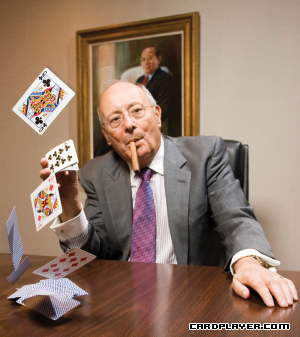






PPA Chairman Discusses Poker's Future in Interview -- Part IFormer New York Senator Talks About PPA's Goals |
|
|
 The Poker Players Alliance has had a busy start to 2009. It is currently lending its support to a poker trial that is about to take place in South Carolina, and it has been influential in recent poker victories in the court rooms around the country.
The Poker Players Alliance has had a busy start to 2009. It is currently lending its support to a poker trial that is about to take place in South Carolina, and it has been influential in recent poker victories in the court rooms around the country.
PPA Chairman Alfonse D’Amato discusses a wide variety of topics in an interview with Card Player in Part 1 of a two-part interview. The former Republican New York Senator recently published an article in Roll Call, the Capitol Hill magazine, calling for the regulation of online poker.
In Part 1 of the interview, D’Amato talks about the legislation that is on tap for the new legislative session and what some of the hurdles online poker has faced thus far, including the opposition it has received from the NFL.
The PPA was founded in 2005 to establish favorable laws for poker players. D’Amato joined the organization in 2007.
(Part 2 of the interview was published on Feb. 12.)
Card Player: When did you join the Poker Players Alliance, and how has the organization grown since then?
Senator Alfonse D'Amato: I’m in my third year now. I joined after the fiasco of the Midnight Slaughter, when they passed an amendment to the port security act at midnight. It basically prevented the financial institutions from handling any transactions related to people who were playing poker on the Internet.
There was no time to debate it. People were not going to stop the port security act and jeopardize the safety of the ports in our country, notwithstanding that there was this obnoxious provision that 80 percent of the Congress never knew was in there.
Since that time, we’ve made some tremendous strides in gaming support, particularly with members who have signed on to sponsor legislation. Congressman Barney Frank (D-MA) has an omnibus approach, an approach that would basically legalize many activities that this particular legislation prohibits. It would permit poker.
There is the Congressman from Florida, Robert Wexler (D-FL), who has more narrowly crafted legislation that would permit playing poker over the Internet.
And then there is Congresswoman Shelley Berkeley’s (D-NV) legislation, which calls for a study to see the effects of online poker.
We’ve gone from being viewed as villains to building a robust group of over a million members in the Poker Players Alliance. We have the active support of 50 members or more of Congress. I believe that during this next Congress, we have a good opportunity of reversing this madness and allowing people their individual rights in their own homes.
The momentum is clearly on our side.
CP: What do you think are the biggest hurdles moving forward for online poker?
AD: It’s convincing some people that their concerns about youngsters can be dealt with in a very effective way. They have a legitimate concern; they don’t want youngsters to become addicted. We can provide software that can screen out underage participants. So, I think that deals with probably the major concern.
The second concern was that we’d have unsavory people ruining the games. But we can demonstrate by showing what’s taking place in Europe, where every single game can be viewed and stored. We can prevent manipulation. If you license and regulate, you can see to it that it’s an honest game.
If you license and regulate, you can block unsavory characters, and we could ensure people that the cards aren’t stacked against them.
Another thing you have to recognize is that the NFL has played a very substantial role in bankrolling a number of organizations that have come out in opposition to us. We are not interested in legalizing sports betting. That’s not where we’re at. And I think they’re beginning to see that this legislation, as much as it has deprived people of their individual rights, has failed to achieve what they’re concerned about, which is about sports betting and the influence it might have with respect to unsavory and illegal activities that could possibly affect the game itself.
The UIGEA has not curtailed illegal betting. It has not curtailed the kind of activity that they really should be concerned about. I think that, ultimately, they will be less opposed to a provision that provides for the permission to play poker online, provided there are the kinds of controls to see to it that the people who are engaged in this activity are properly screened and that the games are properly regulated and that there will be specific revenues that are derived from the licensing.
We have seen a number of situations where the games have not been fair. We want the games to be fair, but we’re not going to have 100 percent fairness until you license and regulate. It’s like the Prohibition days where you simply banned the sale of alcohol. Then you have people who are drinking chemicals and all kinds of witch’s brew. It caused a lot of problems and even deaths. Once they legalized and regulated [drinking], those incidents were reduced dramatically, and so it will be here. We now have some operators who are unscrupulous and who don’t have the proper type of system to screen out manipulation. If you do have licensing and regulation, you can provide that protection.
I am very hopeful that we are going to achieve some real progress in providing a legislative solution that will permit people to act like grown-ups in their own homes without Big Brother government telling them what they can or can’t do.
Check back to CardPlayer.com tomorrow for the second part of the interview.
